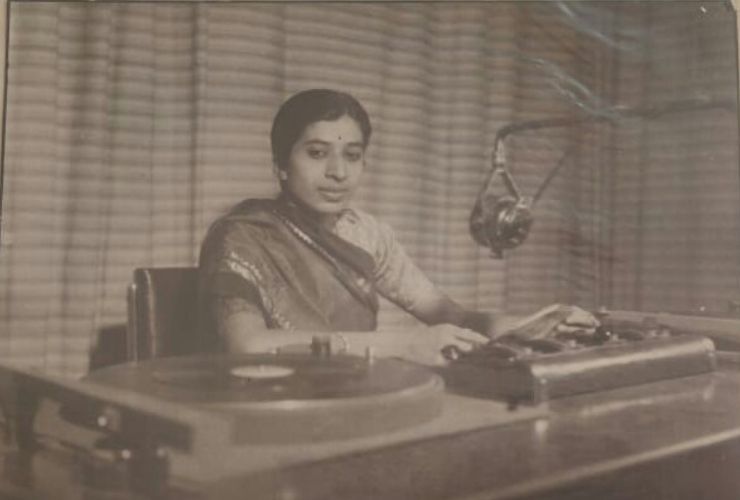
By Rupa Mehta

Vasuben was the first Gujarati woman to become a Station Director of All India Radio. She devoted more than three decades of her life to the medium of radio at a time when it was the most popular (also male-dominated) medium of mass communication. She was a change-maker herself and, when she eventually became a decision-maker, she encouraged creativity and provided space to younger colleagues who could think out of the box. She not only brought about changes in programme content and presentation, but she also transformed the bureaucratic outlook and feel of the AIR stations in her jurisdiction.
One day in 1989, a tall, beautiful woman with excellent posture entered the room of the late H.N. Patro, then Director of Doordarshan Kendra Ahmedabad. He got up from his seat to welcome her. In a commanding voice she asked, “Prabhu, kaise ho? (How are you?).” That was the first time I saw Vasuben and I never forgot that moment. Later, when she walked into the studio, I noticed many other male employees of Doordarshan getting up from their seats and greeting her with obvious regard.
I was surprised to see a woman officer who had retired from government service seven years earlier retaining her aura and continuing to command respect. I was attracted to her strong, evidently empowered personality, especially since, as an officer, I was facing many challenges within Doordarshan’s male-dominated set up. Although I had heard a lot about Vasuben, a renowned radio broadcaster, during my school and college days, it was from 1989 onwards that I became her “dost (friend).” This was the term she invariably used while addressing those she considered her friends – from a 5-year-old child to a 90-year-old woman.
Our “dosti” was a story of sisterhood, too. When I was fighting a legal battle with the management, Vasuben and her almost 90-year-old friend, Virbala Nagarwadia, a freedom fighter, supported me until I had won my battle for justice. Looking back, I realise that Vasuben was a source of self-respect, self-esteem and empowerment to many women, including myself.
A video tribute to Vasuben
Born in Vadodara on 23 March 1924, during the colourful festival of Holi, Vasuben, who only went by this one name, was her parents’ fifth child. Her father, Ramprasad Shashtri, was political secretary to Sayajirao Gaikwad, the then Maharaja of Vadodara. She lost her mother, Saraswatiben, at a very young age.
After graduation, she began a career as a school teacher in Ahmedabad but soon realised that teaching was not for her. She joined All India Radio (AIR) in 1949 as a programmer and retired as Station Director of AIR Ahmedabad and Vadodara in 1982. She was the first Gujarati woman to become a Station Director of AIR. Almost 33 years of her life were dedicated to the medium of radio. It was then the most popular medium of mass communication, and a male dominated one at the time.
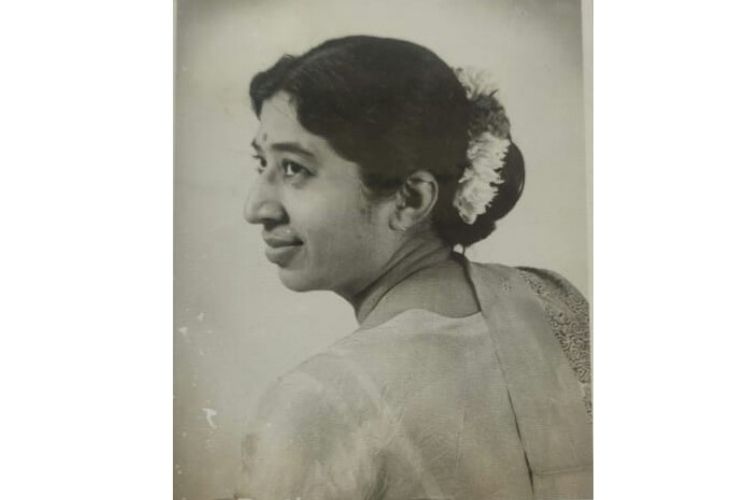 In those early days, Vasuben, who always wore a traditional, Gujarati-style sari, was the talk of the town for her “unwomanly” behaviour. For example, she used to shake hands with men instead of confining herself to the customary namaste with folded hands. The stories she told about those handshakes went quite a way in teaching us about “good touch and bad touch” in the profession.
In those early days, Vasuben, who always wore a traditional, Gujarati-style sari, was the talk of the town for her “unwomanly” behaviour. For example, she used to shake hands with men instead of confining herself to the customary namaste with folded hands. The stories she told about those handshakes went quite a way in teaching us about “good touch and bad touch” in the profession.
Although very creative and keen to produce imaginative radio programmes, she had to struggle at the beginning of her career to convert her ideas into practical radio productions. Once, she wanted to take a group of children in an aeroplane for a programme about how Ahmedabad looked from the sky. When she took this idea to her boss, he was annoyed and asked, “Who will be responsible if something happens to the children? Why do you irritate us? Why don’t you do simple children’s programmes?” This negative attitude upset her but she did not lose heart. Instead she did an innovative programme with children sitting on an elephant!An even more telling example of her bold approach was her desire to make a radio programme with prisoners. She wanted to ask them why they were in jail, to record their experiences and to find out whether, after Independence, prisoners were still languishing in the same condition as when Mahatma Gandhi was imprisoned. She put up this proposal before 1960, during a period when Gujarat was still part of Bombay Province. It was not easy to get the required permission from Mumbai and to record in jail. But she did it, undeterred by the initial rejection. Her powers of persuasion were tremendous and she never left anything half-way.
Vasuben’s major concerns, as a professional, were freedom of expression in deciding programme content and a flexible, conducive atmosphere at the workplace. She recounted a very interesting experience while being interviewed by the well-known media practitioner, the late Hasmukh Baradi. During one of her radio programmes a reference was made in a lighter vein to a pair of oxen, and one of them going on strike. At that time the symbol of the Congress Party was a pair of oxen. An expert who participated in the programme objected to this sentence being on air, arguing that the script should have been scrutinised before the programme was broadcast. Vasuben saw this experience as not just evidence of the conservative approach within the government system but as an encroachment on a broadcaster’s creative freedom.
According to her, in those days, she had to send an English version of her Gujarati programme to headquarters to obtain the necessary permission to broadcast. She felt there were too many restrictions on professionals in All India Radio. The irony is that the situation today may be even worse than in those days.
But she was indominable. As she put it in the interview with Hasmukhbhai, “During my career I learnt many lessons and, when required, I put all rules and regulations aside.” She strongly believed that male decision-makers were very rigid about following rules. They were just government servants – “sarkari babus” – working in a stereotypical environment. She always felt sad if a person involved in making programmes was not innovative and original in his or her thinking.
As a programmer she always wanted to be a change-maker. She felt that were she given the opportunity to be a decision-maker, she would encourage creativity and provide space to those who could think out of the box. She kept this promise to herself when she became the Station Director of All India Radio Ahmedabad, Rajkot and Vadodara. She not only brought about changes in programme content and presentation but also transformed the bureaucratic outlook and feel of the AIR stations in her jurisdiction. These stations were given a cultural identity with typical Gujarati decor. One could feel the touch of an artistic, decent and meticulous woman who wanted to break barriers.
Vasuben was a writer, an actor and, most importantly, a very sensitive and sensible broadcaster who opened the doors of AIR to great literary personalities, music composers, musicians, singers, theatre experts, actors and talented youngsters. The AIR stations became an important hub of Gujarati culture, art and literature. In a way Vasuben was a bridge between society, art and AIR.
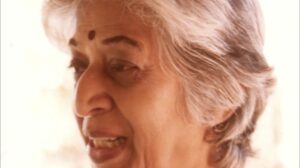 She was very disciplined but not rigid. Although she was a popular boss due to her affectionate nature, she was a tough taskmaster, too, and the entire staff knew it. People were afraid to face her if assignments were not completed in time with due attention to detail. She was a mentor to many upcoming artists, writers and young broadcasters who wanted to explore and experiment creatively. Many sensitive broadcasters were trained under her able guidance and leadership. She was also a role model for many media professionals, especially women. They imbibed from her the basics of planning, management and execution.
She was very disciplined but not rigid. Although she was a popular boss due to her affectionate nature, she was a tough taskmaster, too, and the entire staff knew it. People were afraid to face her if assignments were not completed in time with due attention to detail. She was a mentor to many upcoming artists, writers and young broadcasters who wanted to explore and experiment creatively. Many sensitive broadcasters were trained under her able guidance and leadership. She was also a role model for many media professionals, especially women. They imbibed from her the basics of planning, management and execution.
Vasuben’s imagination and administrative skills came together in some unforgettable concerts broadcast by AIR Ahmedabad. Her concerts, organised in halls with invited audiences, were visual treats, too, even though the primary purpose was audio recording. People felt proud to be invited for such well-designed programmes. “Hey Maa Twamev Sarvam,” a dance and musical programme conceptualised for the Navratri festival, is remembered to this day by those who were invited as guests as well as the AIR staff involved in the production.
Another significant programme was “Rang de Chunariya,” aired during Holi. This programme is memorable not only for its content and presentation but also because it revealed Vasuben’s bold decision-making. She had visualized that guests coming for the programme would be welcomed with flowers of Palash (Flame of the Forest). These blooms were not available in Ahmedabad and had to be acquired from the forests near Ambaji, 200 km away. This was successfully done and without any lengthy paperwork and procedures.
Another telling story about her is that when she retired from AIR Ahmedabad, she herself removed her nameplate while leaving the office. She even advised me to do the same upon my retirement. As she said, “We should carry our self-respect with us. Why should we allow others to bring down our dignity?” I was convinced about her logic – so I followed suit when I retired after 32 years of service.
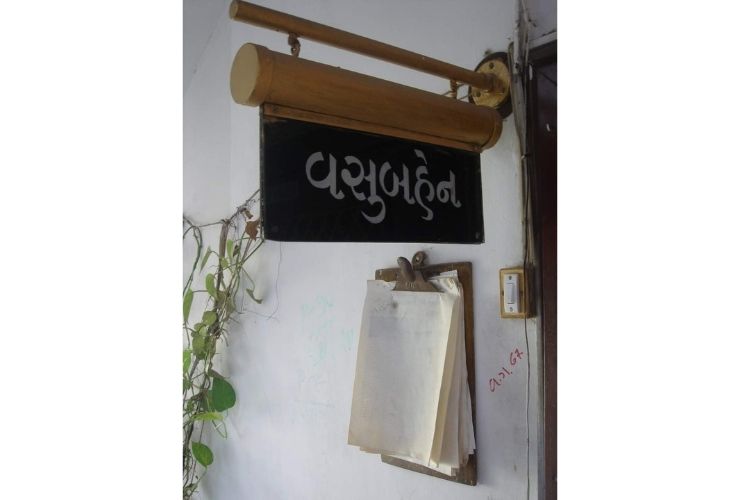
After her retirement, Vasuben was involved with various institutions of social welfare, including the Juvenile Home. Her most important contribution was to women’s education. She was the lifetime President of Stree Kelavani Mandal, an educational institution for women. She strongly advocated a holistic approach to women’s education. As she used to tell her co-workers, “Women are not born weak. The ideals of a male-dominant society make her feel and seem helpless. She loses her individuality by following stereotypes.” Vasuben strongly believed that women do not require a Ms./Mrs. prefix before their names. In her addresses to college girls she used to stress all that women should be considered human beings and not as goddesses with supernatural powers or willing to sacrifice everything. She also told them they should not tolerate any type of violence against women.
She practised what she believed. For example, she was always known as Vasuben – only Vasuben, no father’s name, no husband’s name, no surname at all. She had the courage to cast aside all such patriarchal attachments way back in the 1960s, as well as to assert herself and establish her own identity – as Vasuben.
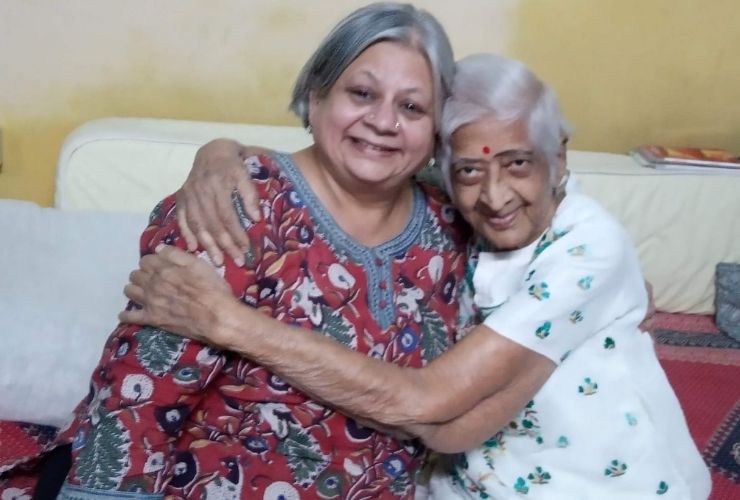
She even filed her nomination to contest the election of the Gujarati Sahitya Parishad as “Vasuben”. The Parishad, a 100-year-old literary organisation, rejected her nomination form saying it was incomplete without a surname/family name. Vasuben, ever conscious of her rights, proved with legal documents that she was Vasuben and only Vasuben. The Parishad was compelled to co-opt her.
She was full of life till the very end. She used to live alone but never complained of loneliness. The doors of her house were always open for friends. And, interestingly, she used to leave a notepad and pen at the entrance of her house for visitors to leave messages if she was not at home when they came. Her neat and clean home was always lively, with friends of all age groups, thanks to her joyful, affectionate, helpful nature and great hospitality. Her fondness for tasty food, beautiful saris, perfumes, card games and unique celebrations of each of her birthdays made her special. Not surprisingly, she formed a group called Anandam, which means happiness, enjoyment.
My last meeting with her – on her 96th birthday – was unforgettable. Watching her eating an ice-cream on a stick was not only a treat for the eyes but a message to all to live life queen size and happily. Dost Vasuben… we love you.
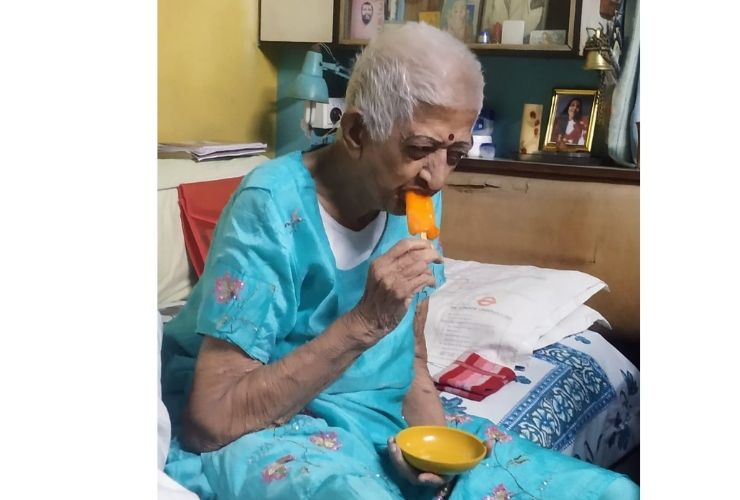
NB: I am happy to have been persuaded to write on Vasuben for the NWMI website. While preparing to write this profile, I got so involved in Vasuben’s life that I went through all her photo albums and videos. We are now working on the audio tapes she had preserved which, together, constitute very interesting archival material. I hope to make use of the material to preserve the memory of this remarkable media woman and am keen to work towards a special presentation on her life on her next birthday.
Rupa Mehta, NWMI member pays tribute to writer, actor, broadcaster, mentor, former colleague, and ‘dost’ Vasuben, who passed away in December 2020.



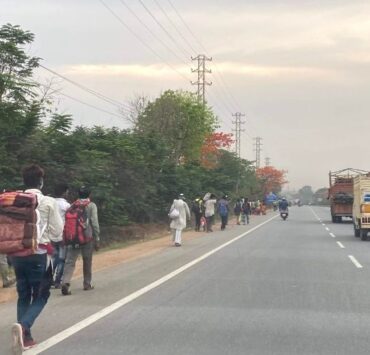
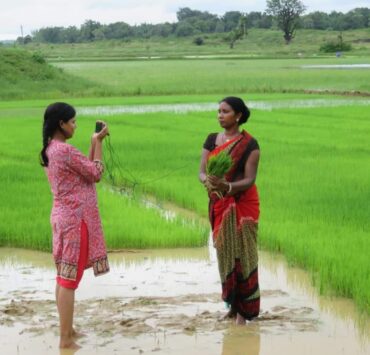
Dear Rupaben, Thank you very much for the write up on your Dost. And glad to see the pics. I am sharing excerpts from your piece for the budding broadcasters. Mrinal Dev Burman.